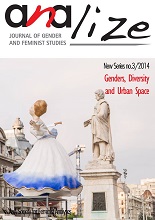Transforming the Sexist City: Non-Sexist Communities of Practice (invited paper)
Transforming the Sexist City: Non-Sexist Communities of Practice (invited paper)
Author(s): Helen JarvisSubject(s): Gender Studies, Rural and urban sociology
Published by: Societatea de Analize Feministe AnA
Summary/Abstract: Walk around any city in the world and you will observe well entrenched patriarchal systems etched deep into the urban fabric. Monumental architecture and statues to the ‘founding fathers’ often provide the most immediate testimony to the historic domination of a wealthy white, male ruling elite (Jarvis et al. 2009). Yet, the sexist city is not simply the legacy of a bygone era and, paradoxically, it is harder to ‘read’ than is at first suggested from this monumental scale. The depth and extent of this sexism can be difficult to discern, not because the evidence is subtle or hidden but instead because it is everywhere routinely normalized and, by the same token, rendered of little account (Bondi 1998). Unravelling this paradox opens up space, not only for critical feminist enquiry, but also for niche demonstration intentional communities of practice and progressive feminist teaching. Rather than to concede a ‘hopeless’ legacy of patriarchy, this paper argues that direct engagement with the sexist city, through field-based epistemologies and methodologies, provides the ideal stimulus for transformation. Furthermore, it is argued that transformation has to be understood in a more nuanced way than is usually the case, beyond opposition, as a combined processes of resisting, imagining, feeling, reflecting and acting mindfully around patriarchy and prejudice. For any progressive transformation to effect change, such as to incubate gender mainstreaming and inclusive urban development, there must be combined critical and creative thought and practice. The following discussion introduces this intertwining of resistance and reimagining through a utopian method of thinking differently about, and envisioning, alternative urban futures. This challenges the tendency in orthodox urban studies to neglect the role of women and gender, where the focus is on ‘top down’ global neoliberal narratives, building instead on a recent resurgence of interest in the social and political spaces of everyday life and a revival of citizenship in civil society. New forms of citizenship coincide with diverse expressions of direct action including practices associated with community-led urban regeneration (Isin 2002: 265). In this context it is necessary but not sufficient to call attention to the contested terrains of women’s claims-making in ‘rights to the city’ urban social movements (Staeheli 2008). Additional theorizing needs to draw on a hopeful urban imaginary that translates strategies of resistance into an actually existing alternative practices and realities. This paper consequently argues that the sexist city should be reconceived as a ‘place to think with’: to do this, discussion turns first to a scale of inter-personal imagination associated with intentional egalitarian communities of practice; then to the transformative role of feminist teaching and learning. In this sense, the topic in question is as much about the nature of transformation, as a paradigmatic process of thinking differently, or ‘otherwise’ (Levitas 2013), as it is about the phenomenon of urban space being constructed and segregated by gendered bodies and power relations of domination and subordination.
Journal: AnALize: Revista de studii feministe
- Issue Year: 2014
- Issue No: 3 (17)
- Page Range: 7-27
- Page Count: 21
- Language: English

